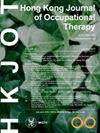成人精神疾病的感觉调节干预:范围综述
IF 1.6
4区 医学
Q4 REHABILITATION
引用次数: 0
摘要
感觉调节干预(SMI)帮助精神疾病患者调节情绪和生理唤醒。我们的目的是进行一项范围综述,以确定研究设计、地理分布、模式/方案、在精神疾病患者中使用SMI的障碍和促进因素。方法采用Arksey和O'Malley的框架,对2010年1月至2020年11月期间发表的关于重度精神障碍的研究进行系统检索。结果共找到17篇相关文献。其中一项是病例对照研究,定性研究(N = 3)、混合方法研究(N = 3)和病例研究(N = 3),其余是试验性介入研究(N = 8)。疗程从2到30分钟不等,持续2天至3年。使用SMI的促进因素具有成本效益高、适应性强等特点。障碍在于感官物品的维护。与本体感觉、前庭和触觉相关的感觉调节项目是纳入研究中基于SMI的干预措施中经常使用的。结论SMI作为一种对精神疾病个体的职业治疗干预正在不断发展,建议在未来进行更有力的研究。本文章由计算机程序翻译,如有差异,请以英文原文为准。
Sensory modulation interventions for adults with mental illness: A scoping review
Introduction Sensory Modulation Interventions (SMI) assist people with mental illnesses to regulate emotional and physiological arousal. We aimed to conduct a scoping review to identify the study designs, geographical distribution, modality/regimen, barriers and facilitators in using SMI for individuals with mental illnesses. Methods A systematic search was conducted using Arksey and O'Malley’s framework with studies published on SMI from January 2010 to November 2020. Results 17 articles were found to be relevant. One was a case-control study, qualitative ( N = 3), mixed-method ( N = 3), and case studies ( N = 3), and the rest were pilot interventional studies ( N = 8). The duration of sessions ranged from 2 to 30 minutes for 2 days to 3 years. The facilitators in using SMI were of being cost-effective and easily adaptable. Barriers were in terms of maintenance of sensory items. Sensory modulation based items related to proprioception, vestibular and tactile were the frequently used in the SMI based interventions used in the included studies. Conclusions SMI as an occupational therapy intervention for individuals with mental illnesses is evolving and more robust studies in the future are recommended.
求助全文
通过发布文献求助,成功后即可免费获取论文全文。
去求助
来源期刊
CiteScore
1.10
自引率
0.00%
发文量
18
审稿时长
>12 weeks
期刊介绍:
The Hong Kong Journal of Occupational Therapy is the official peer-reviewed open access publication of the Hong Kong Occupational Therapy Association. The Journal aims to promote the development of theory and practice in occupational therapy (OT), and facilitate documentation and communication among educators, researchers and practitioners. It also works to advance availability, use, support and excellence of OT and maintain professional standards to promote better understanding of OT.

 求助内容:
求助内容: 应助结果提醒方式:
应助结果提醒方式:


